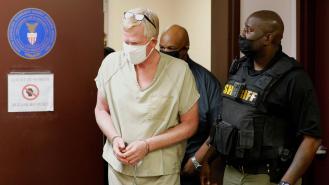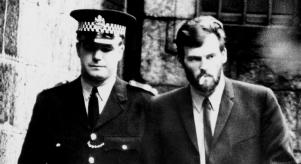
The Staircase: The twisting true story of Michael Peterson's trial
Michael Peterson was born on 23rd October 1943 and spent his formative years in Durham, North Carolina. He enrolled at Duke University before embarking on a stint in the Vietnam War as a Marine Corps officer. In various interviews, he expressed a desire to experience combat firsthand and harboured ambitions of penning the ‘great American war novel’.
Upon his return from Vietnam, Peterson redirected his focus towards a career in writing, delving into both fiction and journalism. He contributed to publications such as the Herald-Sun and even ventured into local politics as a mayoral candidate in Durham. Over time, Peterson authored three novels, collaborated on a biography, and co-wrote another work of fiction.
Peterson claimed to have suffered a significant injury to his right leg during his military service, boasting of receiving two Purple Hearts. However, it was later uncovered that this account was fabricated, although he had indeed been awarded the Silver Star and the Bronze Star with Valor for his actions in Vietnam.
Peterson tied the knot with Patty Sue, and together they welcomed two sons, Clayton and Todd. In 1980, the family relocated to Germany, where Patty pursued a career teaching elementary school for children of U.S. expatriates. However, their marital union began to unravel in the 1980s, culminating in a divorce during the 1990s. Following the split, Peterson returned to Durham, North Carolina.
Though his sons remained in Germany with their mother, Peterson took guardianship of Margaret and Martha Ratliff, the daughters of his late friends Elizabeth and George Ratliff. Peterson's friendship with the Ratliffs led him to care for their children after their untimely passing. Later, Clayton and Todd rejoined their father in Durham, where Peterson had begun a new chapter with Kathleen Atwater.
The couple were married in 1997, and Kathleen's daughter, Caitlin, became the fifth member of their blended family. Residing in a stately 1940 mansion nestled in Durham's picturesque Forest Hills neighbourhood, the family frequently hosted large gatherings in their expansive 11,000-square-foot home.
At approximately 2:43am on 9th December 2001, the Durham County 911 centre received a frantic call from a man. ‘Oh,’ the man exclaimed, ‘1810 Cedar Street! Please! My wife had an accident. She’s still breathing! She fell down the stairs!’ The caller was Michael Peterson. Upon police arrival at the residence, they discovered Kathleen lying at the base of the staircase, surrounded by blood. Traces of blood were found on the bottom of her feet and the nearby wall, seemingly dried. She was pronounced dead upon the arrival of emergency responders.
Observing bloodstains on Peterson's clothing and skin, the officers intervened when he attempted to wash his hands, apprehensive that they were dealing with a crime scene rather than an accident. According to Peterson's account, Kathleen retired to bed around 11:30pm, while he remained outdoors near the pool. The couple had been celebrating Peterson's recent news of one of his books being optioned for a film adaptation, during which they consumed a couple of bottles of wine. Peterson suggested that Kathleen's death was a result of an accidental fall down the stairs, possibly due to intoxication.
Peterson recounted that he discovered Kathleen's body when he went to tend to their bulldogs, Wilbur and Portia, for the night. He claimed to have cradled her in his arms until the arrival of police and paramedics.
The medical examiner who was on call that morning, Kenneth Snell, ruled Kathleen’s death as an accident, writing in his report: ‘Blood had been wiped up partially in the stairs with paper towels. Blood is present in the bottom of the stairwell and on the last few steps. Appears she hit her head on the step above the corner, then hit the floor in the corner of the stairs and then landed at the base of the stairs on her back. My findings suggest her head striking the stairs at least twice. My findings suggest accident.’
However, the trajectory of events took a sharp turn when Kathleen's body underwent examination at the medical examiner's office. Pathologist Dr Deborah Radisch's findings diverged from the initial assessment. She discovered at least seven deep lacerations to the back of Kathleen's head during the autopsy. Further investigation revealed blood on Kathleen's brain without any accompanying fractures. Dr Radisch concluded that Kathleen had been murdered, thrusting Peterson into the spotlight as the primary suspect.
Within a week of the incident, Peterson enlisted the services of defence attorney David Rudolf. Despite this legal representation, Peterson was arrested and charged with Kathleen’s murder. However, he was soon released on an $850,000 secured bond, leveraging his home as collateral. Conditions of his release included surrendering his passport and a pledge not to leave North Carolina. But as this investigation was ongoing, Peterson found himself at the forefront of another investigation.
In a striking parallel to Kathleen's tragic death, another unsettling incident unfolded in 1985 involving Elizabeth Ratliff, who was discovered lifeless at the foot of a staircase in her German residence. The night before her death, she had shared dinner with the Petersons, with Michael Peterson driving her back home. German authorities initially deemed her death accidental. However, following Kathleen's eerily similar fate, Elizabeth's remains were exhumed. A subsequent examination revealed that she died as a result of a homicidal assault.
Initially, Peterson's entire family rallied behind him in staunch defence. However, as the case unfolded, Caitlin and Candace Zamperini, Kathleen’s sister, severed all ties with him, convinced of his guilt. Caitlin later pursued legal action against Peterson, filing a wrongful death lawsuit which was ultimately settled for $25 million.
During Peterson's trial for Kathleen’s murder in July 2003, the prosecution put forth a compelling narrative. They argued that Kathleen had discovered that her husband was bisexual, prompting him to orchestrate her murder in a bid to seize control of her substantial assets, including a $1.4 million insurance policy. At the time of her passing, Kathleen had concerns about potential job loss at Nortel, where she had an annual salary of $145,000. She confided these anxieties about the family's financial strain to her sister.
The prosecution suggested dire financial circumstances within the Peterson household. Records revealed over $143,000 in credit card debt by late 2001, with expenditures eclipsing income. Additionally, emails surfaced wherein Peterson solicited financial aid from his children leading up to Kathleen’s death. In one instance, he asked his ex-wife, Patty, for a $30,000 home equity loan to alleviate credit card debts accrued by their adult sons, Clayton and Todd. He ended the message with: ‘It is simply not possible for me to discuss this with Kathleen.’
The prosecution said that the blood-spattered at the scene suggested Peterson had beaten Kathleen over the head, but the defence countered this and said the evidence showed she fell down the stairs after drinking alcohol and taking Valium.
Both sides presented their own experts to testify about the findings, and they both contradicted one another. According to the prosecution, the murder weapon was a fireplace blow poke, which had allegedly disappeared from the home around the time of the murder. However, the defence revealed that the fireplace blow poke had since been found, and it contained no blood evidence to indicate it was the murder weapon.
The defence also refuted that the Petersons were short of cash, with defence attorney David Rudolf saying they had more than $1 million in resources on top of the $600,000 to $700,000 of equity in their home. He added that Peterson would have fared just as well financially if Kathleen remained alive because of her large salary. The defence also maintained that Kathleen knew that Peterson was bisexual, and she accepted this part of his life. His children stressed that their marriage was a happy one.
Following one of the lengthiest trials in North Carolina's history, Michael Peterson was found guilty of Kathleen Peterson's murder on 10th October 2003. He received a life sentence without the possibility of parole. Despite the conviction, Peterson's defence team initiated multiple appeals. In 2003, a fresh theory emerged from Peterson's new defence team. They proposed that Kathleen had been attacked by a barred owl outside their home, suggesting that the lacerations on her head aligned with the bird's talons.
Peterson was released on bond in December 2011, after a judge ordered a new trial, citing misleading testimony from a blood analyst during the original trial. Two years later, the North Carolina Court of Appeals granted the state’s request for a new hearing to review the ruling for a new trial. But then in February 2017, Peterson entered an Alford plea, a type of guilty plea in which a defendant maintains their innocence while acknowledging there is enough evidence to convict them.
In the wake of the plea, Peterson was resentenced to 86 weeks in prison and was released due to time served. He returned to Durham, North Carolina, where he sold the house that Kathleen died in. He lived with his ex-wife, Patty, for two years until she passed away in 2021. He was never charged in connection with the suspicious death of Elizabeth Ratliff.
The legal saga surrounding Michael Peterson's trial for the murder of Kathleen Peterson was immortalised in a documentary series titled The Staircase. Initially aired in 2004, the series underwent expansions and updates with additional episodes over time, offering viewers an in-depth exploration of the case's intricacies.
More recently, the narrative of The Staircase found its way onto screens once again, this time reimagined as a crime drama with actors Colin Firth and Toni Collette portraying Michael and Kathleen Peterson.









